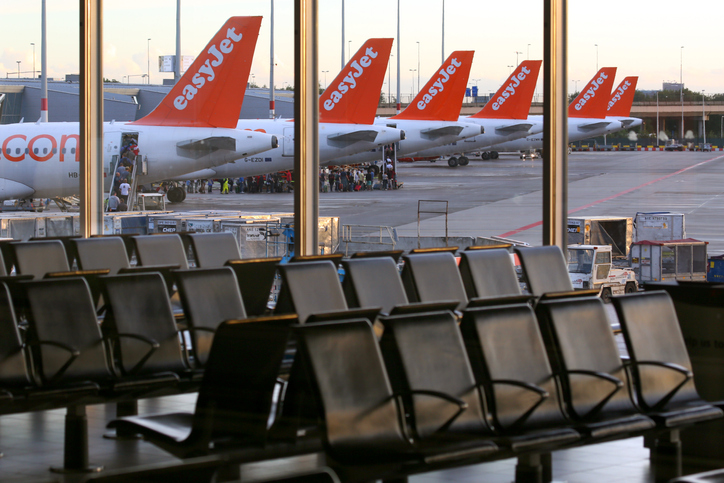ii view: easyJet flags first ever full-year loss
Its shares have more than halved in 2020, but are rival low-cost airlines better positioned?
8th October 2020 15:33
by Keith Bowman from interactive investor
Its shares have more than halved in 2020, but are rival low-cost airlines better positioned?

Fourth-quarter trading update to 30 September
- Revenue down 73% to £620 million
- Pre-tax loss of between £295 million to £325 million, down from a profit of £528 million
Guidance:
- Headline full-year loss before tax in the range of £815 million to £845 million
- Expects to fly 25% of planned capacity for Q1 2021
Chief executive Johan Lundgren said:
"Based on current travel restrictions we expect to fly c.25% of planned capacity for Q1 2021 but we retain the flexibility to ramp up capacity quickly when we see demand return and early booking levels for summer '21 are in line with previous years.
"Aviation continues to face the most severe threat in its history and the UK Government urgently needs to step up with a bespoke package of measures to ensure airlines are able to support economic recovery when it comes.
"I would like to thank everyone at easyJet who has worked tirelessly to manage through this period. I believe that, as a result, and due to our decisive response to the pandemic, we are well positioned for the recovery".
ii round-up:
Low-cost airline easyJet (LSE:EZJ) today flagged an expected full-year loss of up to £845 million as its services remained decimated by the coronavirus pandemic.
Flight numbers or capacity for the current winter 2021 quarter are expected to run at just 25% of its previously planned numbers, down from 38% in the fourth quarter. Cash burn in the final quarter is forecast to be under £700 million, down from £774 million in the prior period. The fourth-quarter loss is expected to be lower than that made in the third quarter.
easyJet shares were little changed in UK trading having fallen by more than 60% year-to-date. Planned first-quarter capacity of 25% compares to current Wizz Air (LSE:WIZZ) and Ryanair (LSE:RYA) forecasts at 40% to 50%.
Measures taken by the Luton headquartered airline to battle the pandemic include cutting staff numbers by around a third and selling and leasing back assets such as planes and buildings. Passenger numbers for the year to the end of September halved to 48 million. Since the outbreak of Covid-19, easyJet has raised over £2.4 billion.
Group net debt has risen to £1.1 billion from £326 million this time last year. The airline’s cash position currently stands at £2.3 billion (as of 30 September 2020).
Given the overhang of the pandemic, management will not be recommending payment of a final dividend.
Full-year results are scheduled for 17 November.
ii view:
Investors in any airline company must be prepared for an often-turbulent ride. Volatile fuel costs, the threat of terrorism and industrial action by staff can all hit hard. But the Covid pandemic has taken the hit to the industry to a new level. Today, easyJet's CEO called on the UK government to urgently come forward with a bespoke package of measures.
Broker Morgan Stanley, assuming a full grounding of easyJet’s planes, currently estimates that it has less than 10 months of sufficient liquidity. This compares to well over 12 months of liquidity for both Ryanair and Wizz Air.
For investors, the potential for easyJet to raise further funds if needed, and the possibility of UK government action, offer some reassurance. Both lower cash burn and reduced losses over recent quarters also offer positives. But for now, given the ongoing pandemic and the uncertain outlook, its shares are currently for brave long-term investors.
Positives:
- Both cash burn and losses reduced over recent quarters
- Half of its aircraft fleet is unencumbered
Negatives:
- Market demand not expected by industry body to recover to 2019 levels until 2023
- Many factors outside of management’s control can impact performance
The average rating of stock market analysts:
Buy
These articles are provided for information purposes only. Occasionally, an opinion about whether to buy or sell a specific investment may be provided by third parties. The content is not intended to be a personal recommendation to buy or sell any financial instrument or product, or to adopt any investment strategy as it is not provided based on an assessment of your investing knowledge and experience, your financial situation or your investment objectives. The value of your investments, and the income derived from them, may go down as well as up. You may not get back all the money that you invest. The investments referred to in this article may not be suitable for all investors, and if in doubt, an investor should seek advice from a qualified investment adviser.
Full performance can be found on the company or index summary page on the interactive investor website. Simply click on the company's or index name highlighted in the article.